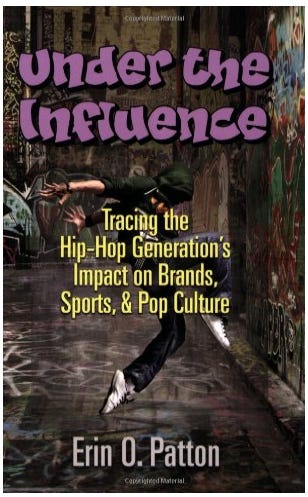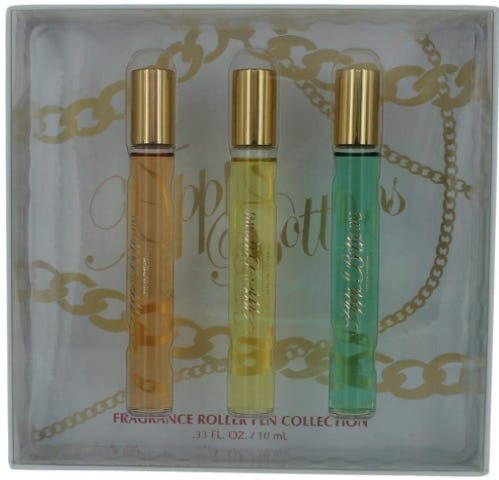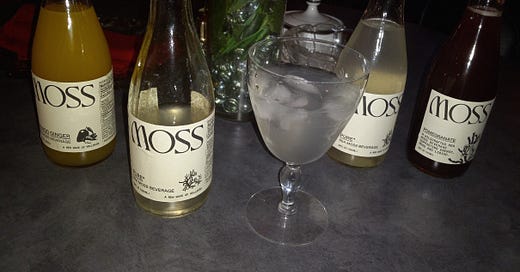
From Michael Jordan to Nelly, Erin O. Patton is no stranger to marketing
Sports marketing professor and author speaks on hip-hop marketing and catering to an African-American target audience
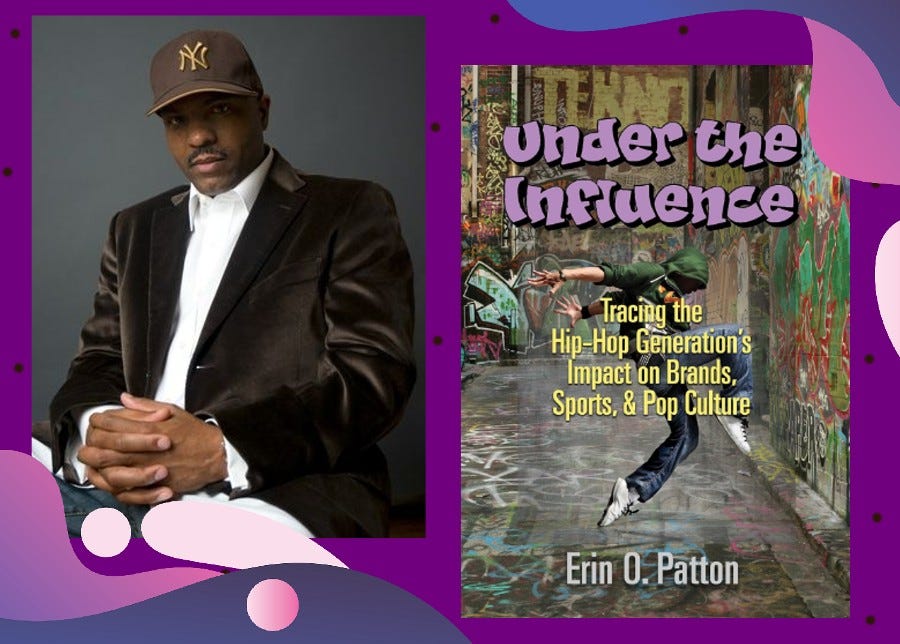
Writer’s note: The following post was originally published on the now-defunct website Examiner.com. This interview with Erin O. Patton was completed and published on May 9, 2010. All copy has been lightly proofread and edited slightly for readability. To read the original, click here.
Pittsburgh native and Northwestern University (Evanston) graduate Erin O. Patton is an aficionado in branding, sports marketing and advertising in hip-hop culture. The marketing expert has worked on the clothing apparel for athletes such as Michael Jordan and Stephon Marbury, counseled Internet service provider Earthlink, and has won countless awards, including the Innovator Award from the Advertising Research Foundation (ARF).
He’s also the author of “Under the Influence: Tracing the Hip-Hop Generation’s Impact on Brands, Sports & Pop Culture,” where he gives detailed tips about how hip-hop connects in advertising.
ADVERTISEMENT ~ Amazon
As an Amazon affiliate, I do earn a percentage from each sale while using my referral links.
Patton is a professor of Sports Marketing in the Cox School of Business at Southern Methodist University (SMU) in Dallas, Texas, and has been a speaker for ESPN, CNN, VH1 and BET. Before his trip to Chicago in May 2010, he took time to speak with Shamontiel, the Chicago News & Events Examiner, about his work over the years, how advertising has changed in the 20 years he’s been involved, and whether hip-hop going mainstream helps or hurts the culture.
Shamontiel L. Vaughn: In today’s advertising, I’m starting to notice that advertisers are not only advertising to an African-American audience, but there are more African-Americans in the commercials and more African-American families. Have you noticed that as well?
Erin O. Patton: Yes. I think advertisers have come to the realization that the African-American audience and population is not monolithic. There are a range of experiences and ways to connect with them. I think what we're seeing is recognition of that and different segments within the African-American market that companies and brands can align with, depending on who they are and what their objectives are.
SLV: What do you feel is the biggest misconception about selling to an African-American audience?
EP: One size fits all. [Advertisers are believing] you can connect with the African-American audience with a standard approach. In some cases, that's hip-hop. For some people, that's understandable. But given the way we look at the market is more from a psychographic standpoint, which is based on lifestyle and mindset and attitude. We know that there are a range of experiences and attitudes and segments within the African-American market. They don't all respond to the same message. The second thing would be the misconception that African-Americans can be reached through mainstream channels. Although African-Americans have assimilated and become part of the mainstream, there is still a very strong desire to speak to them in ways that resonate culturally as well as through some of the distinct attitudes toward brands.
Recommended Read: “Michael B. Jordan said sea moss drinks were his 'obsession,' so I tried it ~ For people with high blood pressure, Moss beverages may be a good option”
SLV: In your book, you mentioned major artists working with well-established companies. What made you decide on that as opposed to them creating their own brand and creating their own product? We'll use Robin Thicke as an example. Instead of having a Robin Thicke fragrance, he went with HUGO Boss. But the rapper Nelly did Apple Bottom, and we know Apple Bottom is Nelly’s.
ADVERTISEMENT ~ Amazon
As an Amazon affiliate, I do earn a percentage from each sale while using my referral links.
EP: I’m not clearly advocating either. In [“Under the Influence”], the example that l used was Beyoncé and her House of Dereon line, which has met some success in the marketplace. But what I was speaking to was the opportunity to create a brand or a product line from an existing company that would allow that particular artist to really capture and resonate with the target audience they're going after. For example, with House of Dereon, initially it was based on Beyonce's own lifestyle. She's predisposed to luxury markets and luxury brands. But if you look at her core audience, they don't necessarily have the means to purchase Jimmy Choo and some of these other high-end brands. … Beyoncé working with Jimmy Choo would be something that would allow her to reach that high-end market who may not be open to buying House of Dereon. She could segment her brand to appeal to a high-end, premium audience but then do something with the masses like House of Dereon. In essence, they ultimately did.
I would suggest that there are opportunities for those particular celebrities to partner with and create a product that allows that company to do what they do best and allows the artist to do what they do best. There's tons of opportunity for an artist to partner with a brand that has an established position and do a signature line as opposed to creating one from scratch. That's not to discount the importance of entrepreneurship. Many artists have been able to leverage the music and use their entrepreneurial drive. You mentioned Nelly. Beyonce and Jay Z and others have been able to do it in their own brands.
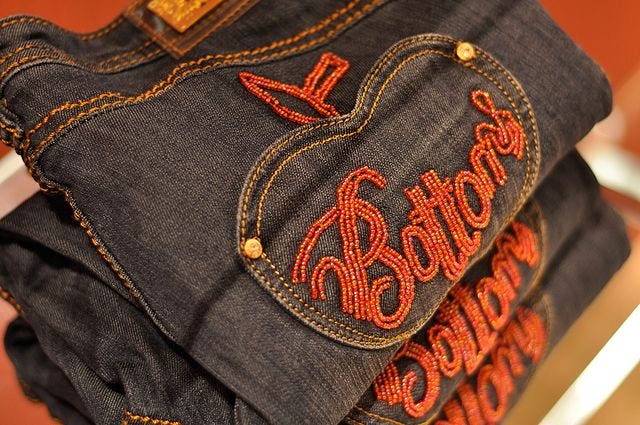
SLV: Hip-hop seems to be so influential in starting styles and stopping styles. How do you feel about hip-hop apparel going mainstream? Do you think it dilutes the culture? In your book, you talk about a Korean boy that was all in hip-hop gear but he really didn't know anything about hip-hop. Does it insult the culture for someone to wear the clothes and talk the talk but not know anything about the culture?
EP: It depends on how they're exercising it. If there are gross misrepresentations of the culture, then I think that's a problem. It's a double-edged sword. For the longest time, hip-hop has had the desire to have mainstream acceptance. Artists boycotted the Grammys because they didn't feel they were getting the recognition. But on the other hand, what comes with that is the commercialization of the music and the culture. There can be a medium, and that's ultimately what we're striving for. As long as the authenticity of the culture is maintained, I certainly don't see anything wrong with getting that mainstream acceptance and having the culture embraced by those outside of the culture itself. Individuals who understand the culture and come from the culture can play the role as gatekeepers. We can have the balance we're seeking.
SLV: You've worked with a lot of different clients like Absolut and Starbury and Jordan. What has been your most memorable client to work with and why?
Patton: I would say the Jordan brand just because it was such an industry-changing event. We were looking to essentially create and change the course of an industry and history. It took a lot of time and effort from a lot of talented people to make it happen and a lot of obstacles we encountered to reach the heights that it now has.
SLV: How do you feel like advertising has changed over the years? Or do you?
Patton: Some things have changed, and some things haven't.
SLV: What would you say the biggest change is?
Patton: Social media is big, and we're seeing a lot more organic advertising. [Another big] influence of urban culture [includes] advertising and the utilization of icons from the culture, as well as those that are not necessarily iconic or catalysts for change. Having that ability to affect popular opinion and popular culture is something that has changed considerably. It's not just who's in front of the camera but also now who's behind the camera, producing and creating spots, and making connections with the consumer through an advertising medium even to the extent of being considered for marquee platforms like Super Bowl ads.
On the flip side, there's not as much representation as we need. There have been recent reports on the lack of minorities in advertising agencies, which quite honestly to be having that conversation is somewhat of a slap in the face to those who have worked very diligently to bring the perspective of African-Americans in the urban market and hip-hop.
SLV: For someone who wants to succeed in the advertising industry, what advice would you give them to succeed?
EP: Become a change agent.
SLV: Is a change agent someone who tries to change the trends?
Patton: Exactly. Someone who looks at the status quo and says, “That's not good enough.” When we look at the advertising industry now, there's not a whole lot of creativity and innovation. There are a lot of brands that are playing it safe and a lot of brands that are marketing and communicating to the general market, which we know is transcultural now. There's the opportunity for those to look at the industry and say, “We’re going to demonstrate another way of doing this."
Recognize the influence that you have. Leverage all of the tools, all the technology and the opportunities that exist to really come in and be change agents. See themselves as not just minorities in the industry but to see themselves as gatekeepers [for] what is becoming the new majority, and help agencies recognize that point of cultural collision where mainstream and urban culture meet.
The second would be to cultivate relationships, understanding meaningful relationships within the industry. Do more than exchange business cards or meet someone and hope that next big thing comes overnight. Relationships are cultivated in time and over time, and it does require a certain amount of patience.
Finally, it would be work ethic. As much as this generation has at their disposal by way of tools and technology, I think the one thing to be desired is the work ethic and just how willing they are they are to work for the success. They're going to hear “no” a lot more than they’ll hear “yes,” but learn from it and make adjustments along the way. Be persistent and recognize that there will be obstacles, and turn those obstacles into stepping stones.
Did you enjoy this post? You’re also welcome to check out my Substack columns “Black Girl In a Doggone World,” “BlackTechLogy,” “Homegrown Tales,” “I Do See Color,” “One Black Woman’s Vote” and “Window Shopping” too. Subscribe to this newsletter for the monthly post on the third Thursday.
If you’re not ready to subscribe but want to support my writing, you’re welcome to tip me for this post! I’ll buy a dark hot chocolate on you. Thanks for reading!




